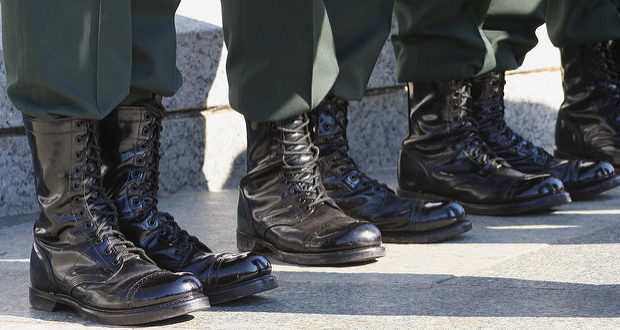New Report Offers Road Map For Transgender Military Service
SAN FRANCISCO, CA – Three retired US military General Officers, including the former chief medical officer of the US Army, issued a joint statement today concluding that the military’s ban on transgender service could be eliminated in a straightforward manner that is consistent with military readiness and core values.
Their statement accompanies the release of a new study, “Report of the Planning Commission on Transgender Military Service,” which finds that allowing transgender personnel to serve in the military “is administratively feasible and will not be burdensome or complicated,” and provides a detailed roadmap for the policy change. According to the Generals’ statement, the report “shows that implementation could proceed immediately and will be successful in its execution.” It also suggests the change is inevitable, noting the US will “likely” join the 18 other countries that already permit transgender service.
The statement and report released today come on the heels of a recent change in Defense Department (DOD) policy concerning transgender troops. On August 5, 2014, DOD eliminated a regulation designating “sexual and gender identity disorders” as grounds for administrative discharge. While Army, Navy and Air Force regulations continue to require the discharge of transgender personnel, the elimination of the DOD-wide ban means that service branches are no longer required to designate transgender identity as grounds for discharge, and could opt to allow transgender personnel who are already serving to remain in service.
The full statement of the retired General Officers is as follows:
“We spent three months serving on a research commission that investigated administrative aspects of transgender military service, with a view toward maintaining readiness and alignment with core military values of dignity and respect. Today, our commission releases a report, which focuses on how to implement inclusive policy in allowing transgender Americans to serve their country. Our conclusion is that allowing transgender personnel to serve openly is administratively feasible and will not be burdensome or complicated. Three months have passed since Defense Secretary Hagel announced a willingness to review the military’s ban on transgender service, an effort the White House indicated it supports. Our new report shows that implementation could proceed immediately and will be successful in its execution.”
The Generals who issued today’s statement are Major General Gale S. Pollock, former Acting Surgeon General of the US Army; Brigadier General Clara Adams-Ender, retired Chief of the US Army Nurse Corps; and Brigadier General Thomas A. Kolditz, a Yale University professor and Professor Emeritus at the US Military Academy at West Point, where he led the Department of Behavioral Sciences and Leadership. Their report points out that, unlike “don’t ask, don’t tell,” the ban on openly gay service that was repealed by Congress in 2010, the transgender service ban is not a statutory bar, but falls “under the authority and jurisdiction of the President and Secretary of Defense.” This month’s Defense Department regulatory change appears to transfer that authority—at least for determinations of retention—to the individual services.
In an accompanying statement, Commission Co-Chair Shannon Minter, Legal Director of the National Center for Lesbian Rights, called on the White House and Pentagon to follow through on implementing a fully inclusive policy. His full statement is as follows:
“The three distinguished retired Generals continue to serve their country with the release of today’s new report, which confirms what we learned from NATO allies and the repeal of ‘don’t ask, don’t tell’ here at home: that discriminatory policy is unnecessary, inconsistent with the core values of the military, and can be eliminated without in any way undermining readiness. DOD’s recent effort to begin to dismantle regulations banning transgender troops is a welcome step, but it is now essential that DOD take the next step and replace the ban with new, inclusive policies. Today’s new report provides a comprehensive roadmap of the new policies that are needed for the full implementation of an inclusive approach, and further establishes to the Administration that a new policy could be successfully executed.”
The new report, co-authored by a nine-member expert Commission, is the second in a series on transgender military service released this year by the Palm Center. The first report, released in March and co-signed by a former US Surgeon General, concluded that the current ban on transgender military service is not based on sound medical reasoning, and called for military experts to “formulate administrative guidance” to address all implementation aspects of creating a new, inclusive policy. The recent regulatory change appears to be a first step in following the March report’s recommendation to update rules so as to create policy that is inclusive of transgender personnel.
Today’s Commission report responds to the call for administrative guidance, providing a roadmap that identifies 14 aspects of policy formulation for a non-discriminatory rule on transgender service. The report is based on research into the 18 foreign nations that currently allow transgender service, as well as lessons learned from US military integration of previously excluded populations, including gay, lesbian and bisexual personnel. It notes that approximately 15,500 currently-serving troops are transgender but must lie about it and cannot access medically-necessary health care as a result.
In addition to finding that the ban could be lifted without harming readiness, today’s report notes the current policy undermines “core military values and principles” including that “all military personnel should serve with honor and integrity, which means that they should not have to lie about who they are; all members of the military should be treated with respect; all persons capable of serving their country should be allowed to do so; and the military should not needlessly separate personnel who are willing and able to serve.”
